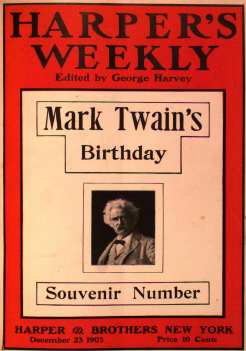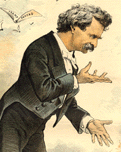Seventieth Birthday Party

The party that Col. George Harvey, editor of The North American Review, threw for MT's arrival at "pier 70" was impressive. 170 friends and fellow writers sat down to dinner and speeches in the Red Room at Delmonico's in New York, while a 40-piece orchestra played accompaniment. Each diner received a foot-high plaster of paris bust of the guest of honor -- as The New York Times put it, "when the distribution had been completed there were just 171 Mark Twain's in the room, including the original." To make up a souvenir album for MT, each table was photographed -- in its special insert on the dinner Harper's Weekly printed all these pictures, and a full-page drawing of the banquet.
In its lead story the next day, the Times called MT the "greatest of living humorists and uncrowned king of American letters," and included transcripts of MT's speech and most of the others. But the main feature of the affair in this account was that "never before in the annals of this country had such a representative gathering of literary men and women been seen under one roof."
The reporter was struck with how every region was included -- "the Far North and the extreme South" -- but chose to emphasize the presence of women, "the strength of the feminine contingent." At Whittier's seventieth birthday, women were admitted into the room only after dinner, to hear the toasts. At Grant's Chicago banquet they were not admitted at all. But on this occasion, the Times noted, "There were fully as many women there as men, and they were not present as mere appendages of their husbands, but as individual representing the art of imaginative writing no less than the men."
At one of the tables, for example, was a 32-year-old Willa Cather, who had already published a collection of poems and one of short stories. At another table was Charles W. Chesnutt, the African American writer; after achieving success with his local color stories but then finding his white audience uninterested in his novels of the color line, Chesnutt was at this point about to abandon his literary career. The Times reporter does not mention his presence, although African Americans, except as servers, were much scarcer than women at these banquets. I don't know who secured Chesnutt's presence here.
As preface to the transcription of MT's remarks, the reporter noted "a strain of melancholy" that ran throughout, especially at the very end: the "last words were spoken with a voice quivering with emotion." But here the emphasis was on speech's funniness: "as the great humorist talked on in his characteristic, inimitable drawl, the men and women present laughed until their laughter turned into groans."
The New York Herald and the New York World also published full accounts of the dinner, each with illustrations.

